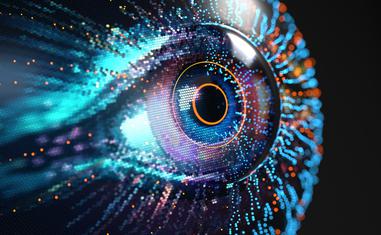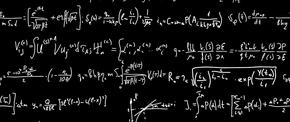The views expressed in our content reflect individual perspectives and do not represent the authoritative views of the Baha'i Faith.
If you’re a writer like me, or a reader like most literate people, you’ve probably heard this question lately: “Will artificial intelligence programs like ChatGPT or Sydney eventually replace writers?”
Uh, no.
Not a chance.
Lest you think of this as hubris, or wishful thinking, or liken it to the fervent traditionalist protestations of an about-to-be-obsolete buggy-whip manufacturer just before the advent of the automobile, or believe that the computational revolution in our civilization will eventually replace all human endeavor, consider this: artificial intelligence, otherwise known as AI, cannot actually think. It cannot reason. Most importantly, it cannot make moral choices.
RELATED: What Can ChatGPT Tell Us About the Human Soul?
All of these profoundly human activities require two things: a mind and a soul. Machines, no matter how sophisticated or fast or interlinked or capable, have neither.
Recently, in a deeply insightful New York Times article, the linguistics professors Noam Chomsky and Ian Roberts, along with the computer scientist and AI director Jeffrey Watamull, said this about AI “thinking” versus actual human thought:
True intelligence is demonstrated in the ability to think and express improbable but insightful things.
True intelligence is also capable of moral thinking. This means constraining the otherwise limitless creativity of our minds with a set of ethical principles that determines what ought and ought not to be …
The Baha’i teachings have a great deal to teach us about this important subject. In May of 1912, long before the advent of our computer era, Abdu’l-Baha gave a speech in Cleveland, Ohio on the eventual outcomes of a solely material civilization. In it, he compared the state of our material and technological civilization to the potential moral, ethical, and spiritual results of a more divinely-oriented one:
Consider: What is this material civilization of the day giving forth? Has it not produced the instruments of warfare and destruction? In olden times the weapon of war was the sword; today it is the smokeless gun. Warships a century ago were sailing vessels; now we have dreadnoughts. Instruments and means of human destruction have enormously multiplied in this era of material civilization. But if material civilization shall become organized in conjunction with divine civilization, if the man of moral integrity and intellectual acumen shall unite for human betterment and uplift with the man of spiritual capacity, the happiness and progress of the human race will be assured. All the nations of the world will then be closely related and companionable …
Notice, in what Abdu’l-Baha said, his emphasis on moral integrity and spiritual capacity – which, he pointed out, can assure “the happiness and progress of the human race …”
No mechanism of artificial intelligence, as Chomsky, Roberts, and Watamull concluded in their article, will ever be able to make the ethical, moral, and spiritual choices we human beings are called upon to make every day of our lives. Yes, AI is a powerful tool, capable of synthesizing enormous amounts of data into understandable factual conclusions – but artificial intelligence systems, say the linguists and scientists, will never have the capacities of even a small child who can tell the basic difference between right and wrong:
… ChatGPT exhibits something like the banality of evil: plagiarism and apathy and obviation. It summarizes the standard arguments in the literature by a kind of super-autocomplete, refuses to take a stand on anything, pleads not merely ignorance but lack of intelligence and ultimately offers a “just following orders” defense, shifting responsibility to its creators.
RELATED: Could Humans Artificially Create a Living Being?
Even the vast machine learning of our supercomputers, and the enormous combined computational power of an unlimited number of terrabytes, cannot make our simplest and most important moral choices. For that, we need spiritual educators – Christ, Buddha, Moses, Krishna, Muhammad, and most recently Baha’u’llah, the prophet and founder of the Baha’i Faith – to direct us in those decisions. In his book Some Answered Questions, Abdu’l-Baha explained:
Now, we need an educator who can be at the same time a material, a human, and a spiritual educator, that his authority may have effect at every degree of existence. And should anyone say “I am endowed with perfect reason and comprehension, and have no need for such an educator,” he would be denying the obvious. …
It is therefore clear and evident that man stands in need of an educator. … He must likewise lay the foundations of human education – that is, he must so educate human minds and thoughts that they may become capable of substantive progress; that science and knowledge may expand; that the realities of things, the mysteries of the universe, and the properties of all that exists may be revealed; that learning, discoveries, and major undertakings may day by day increase; and that matters of the intellect may be deduced from and conveyed through the sensible.
He must also impart spiritual education, so that minds may apprehend the metaphysical world, breathe the sanctified breaths of the Holy Spirit … that human realities may become the manifestations of divine blessings …
It is clear, however, that mere human power is incapable of fulfilling this great office, and that the results of human thought alone cannot secure such bounties.
So the next time someone tells you that AI will save us, or replace people, or somehow make thinking and creating obsolete, you might want to beg to differ. Advancements like artificial intelligence will certainly help humanity and expand the possibilities and limits of our material lives, but only the spiritual teachings of a great Educator can confer the moral, ethical, and spiritual impetus we need to prosper, progress, and unite.
You May Also Like
Comments

















God is greater than every great one, even a super intelligent AI. While caution is always advised, there's no need to fear AI so much that we cannot explore it's possible ...usefulness.
AI is now a feature of our world we will all be compelled to engage. We should be proactive in our own futures.